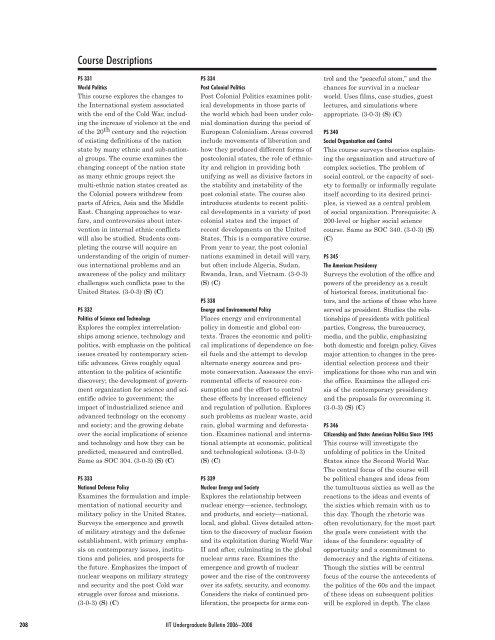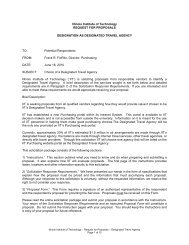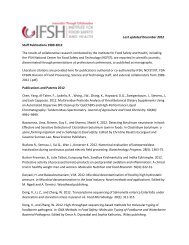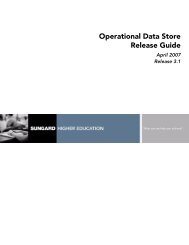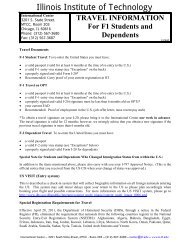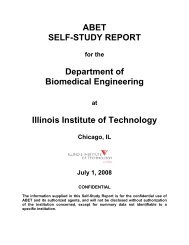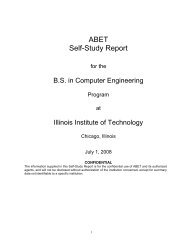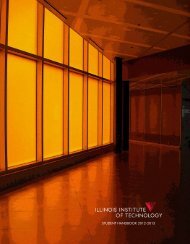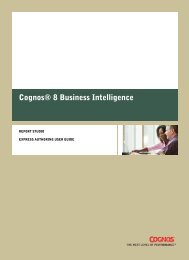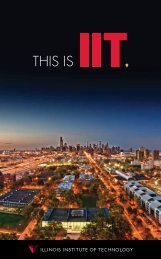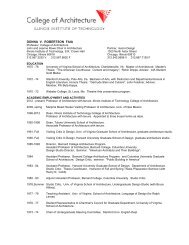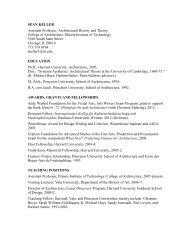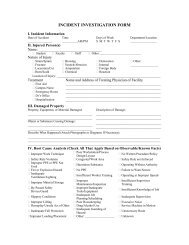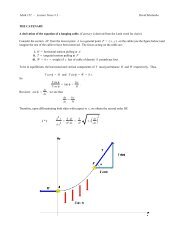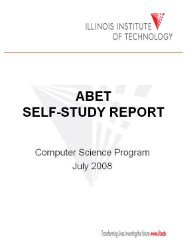Copyright & Disclaimer Information - Illinois Institute of Technology
Copyright & Disclaimer Information - Illinois Institute of Technology
Copyright & Disclaimer Information - Illinois Institute of Technology
You also want an ePaper? Increase the reach of your titles
YUMPU automatically turns print PDFs into web optimized ePapers that Google loves.
208<br />
Course Descriptions<br />
PS 331<br />
World Politics<br />
This course explores the changes to<br />
the International system associated<br />
with the end <strong>of</strong> the Cold War, including<br />
the increase <strong>of</strong> violence at the end<br />
<strong>of</strong> the 20 th century and the rejection<br />
<strong>of</strong> existing definitions <strong>of</strong> the nation<br />
state by many ethnic and sub-national<br />
groups. The course examines the<br />
changing concept <strong>of</strong> the nation state<br />
as many ethnic groups reject the<br />
multi-ethnic nation states created as<br />
the Colonial powers withdrew from<br />
parts <strong>of</strong> Africa, Asia and the Middle<br />
East. Changing approaches to warfare,<br />
and controversies about intervention<br />
in internal ethnic conflicts<br />
will also be studied. Students completing<br />
the course will acquire an<br />
understanding <strong>of</strong> the origin <strong>of</strong> numerous<br />
international problems and an<br />
awareness <strong>of</strong> the policy and military<br />
challenges such conflicts pose to the<br />
United States. (3-0-3) (S) (C)<br />
PS 332<br />
Politics <strong>of</strong> Science and <strong>Technology</strong><br />
Explores the complex interrelationships<br />
among science, technology and<br />
politics, with emphasis on the political<br />
issues created by contemporary scientific<br />
advances. Gives roughly equal<br />
attention to the politics <strong>of</strong> scientific<br />
discovery; the development <strong>of</strong> government<br />
organization for science and scientific<br />
advice to government; the<br />
impact <strong>of</strong> industrialized science and<br />
advanced technology on the economy<br />
and society; and the growing debate<br />
over the social implications <strong>of</strong> science<br />
and technology and how they can be<br />
predicted, measured and controlled.<br />
Same as SOC 304. (3-0-3) (S) (C)<br />
PS 333<br />
National Defense Policy<br />
Examines the formulation and implementation<br />
<strong>of</strong> national security and<br />
military policy in the United States.<br />
Surveys the emergence and growth<br />
<strong>of</strong> military strategy and the defense<br />
establishment, with primary emphasis<br />
on contemporary issues, institutions<br />
and policies, and prospects for<br />
the future. Emphasizes the impact <strong>of</strong><br />
nuclear weapons on military strategy<br />
and security and the post Cold war<br />
struggle over forces and missions.<br />
(3-0-3) (S) (C)<br />
<strong>Copyright</strong> & <strong>Disclaimer</strong> <strong>Information</strong>: <strong>Copyright</strong> © 1994, 1995, 1996, 1997, 1998, 1999, 2000, 2001, 2002, 2003, 2004, 2005, 2006, 2007. CollegeSource®, Inc. and Career Guidance Foundation. CollegeSource® digital catalogs are derivative works owned and copyrighted by CollegeSource®, Inc. and Career Guidance Foundation. Catalog content is owned and copyrighted by the appropriate school. While CollegeSource®, Inc. and Career Guidance Foundation provides information as a service to the public, copyright is retained on all digital catalogs.<br />
<strong>Copyright</strong> & <strong>Disclaimer</strong> <strong>Information</strong>: <strong>Copyright</strong> © 1994, 1995, 1996, 1997, 1998, 1999, 2000, 2001, 2002, 2003, 2004, 2005, 2006, 2007. CollegeSource®, Inc. and Career Guidance Foundation. CollegeSource® digital catalogs are derivative works owned and copyrighted by CollegeSource®, Inc. and Career Guidance Foundation. Catalog content is owned and copyrighted by the appropriate school. While CollegeSource®, Inc. and Career Guidance Foundation provides information as a service to the public, copyright is retained on all digital catalogs.<br />
PS 334<br />
Post Colonial Politics<br />
Post Colonial Politics examines political<br />
developments in those parts <strong>of</strong><br />
the world which had been under colonial<br />
domination during the period <strong>of</strong><br />
European Colonialism. Areas covered<br />
include movements <strong>of</strong> liberation and<br />
how they produced different forms <strong>of</strong><br />
postcolonial states, the role <strong>of</strong> ethnicity<br />
and religion in providing both<br />
unifying as well as divisive factors in<br />
the stability and instability <strong>of</strong> the<br />
post colonial state. The course also<br />
introduces students to recent political<br />
developments in a variety <strong>of</strong> post<br />
colonial states and the impact <strong>of</strong><br />
recent developments on the United<br />
States. This is a comparative course.<br />
From year to year, the post colonial<br />
nations examined in detail will vary,<br />
but <strong>of</strong>ten include Algeria, Sudan,<br />
Rwanda, Iran, and Vietnam. (3-0-3)<br />
(S) (C)<br />
PS 338<br />
Energy and Environmental Policy<br />
Places energy and environmental<br />
policy in domestic and global contexts.<br />
Traces the economic and political<br />
implications <strong>of</strong> dependence on fossil<br />
fuels and the attempt to develop<br />
alternate energy sources and promote<br />
conservation. Assesses the environmental<br />
effects <strong>of</strong> resource consumption<br />
and the effort to control<br />
these effects by increased efficiency<br />
and regulation <strong>of</strong> pollution. Explores<br />
such problems as nuclear waste, acid<br />
rain, global warming and deforestation.<br />
Examines national and international<br />
attempts at economic, political<br />
and technological solutions. (3-0-3)<br />
(S) (C)<br />
PS 339<br />
Nuclear Energy and Society<br />
Explores the relationship between<br />
nuclear energy—science, technology,<br />
and products, and society—national,<br />
local, and global. Gives detailed attention<br />
to the discovery <strong>of</strong> nuclear fission<br />
and its exploitation during World War<br />
II and after, culminating in the global<br />
nuclear arms race. Examines the<br />
emergence and growth <strong>of</strong> nuclear<br />
power and the rise <strong>of</strong> the controversy<br />
over its safety, security, and economy.<br />
Considers the risks <strong>of</strong> continued proliferation,<br />
the prospects for arms con-<br />
IIT Undergraduate Bulletin 2006–2008<br />
trol and the “peaceful atom,” and the<br />
chances for survival in a nuclear<br />
world. Uses films, case studies, guest<br />
lectures, and simulations where<br />
appropriate. (3-0-3) (S) (C)<br />
PS 340<br />
Social Organization and Control<br />
This course surveys theories explaining<br />
the organization and structure <strong>of</strong><br />
complex societies. The problem <strong>of</strong><br />
social control, or the capacity <strong>of</strong> society<br />
to formally or informally regulate<br />
itself according to its desired principles,<br />
is viewed as a central problem<br />
<strong>of</strong> social organization. Prerequisite: A<br />
200-level or higher social science<br />
course. Same as SOC 340. (3-0-3) (S)<br />
(C)<br />
PS 345<br />
The American Presidency<br />
Surveys the evolution <strong>of</strong> the <strong>of</strong>fice and<br />
powers <strong>of</strong> the presidency as a result<br />
<strong>of</strong> historical forces, institutional factors,<br />
and the actions <strong>of</strong> those who have<br />
served as president. Studies the relationships<br />
<strong>of</strong> presidents with political<br />
parties, Congress, the bureaucracy,<br />
media, and the public, emphasizing<br />
both domestic and foreign policy. Gives<br />
major attention to changes in the presidential<br />
selection process and their<br />
implications for those who run and win<br />
the <strong>of</strong>fice. Examines the alleged crisis<br />
<strong>of</strong> the contemporary presidency<br />
and the proposals for overcoming it.<br />
(3-0-3) (S) (C)<br />
PS 346<br />
Citizenship and State: American Politics Since 1945<br />
This course will investigate the<br />
unfolding <strong>of</strong> politics in the United<br />
States since the Second World War.<br />
The central focus <strong>of</strong> the course will<br />
be political changes and ideas from<br />
the tumultuous sixties as well as the<br />
reactions to the ideas and events <strong>of</strong><br />
the sixties which remain with us to<br />
this day. Though the rhetoric was<br />
<strong>of</strong>ten revolutionary, for the most part<br />
the goals were consistent with the<br />
ideas <strong>of</strong> the founders: equality <strong>of</strong><br />
opportunity and a commitment to<br />
democracy and the rights <strong>of</strong> citizens.<br />
Though the sixties will be central<br />
focus <strong>of</strong> the course the antecedents <strong>of</strong><br />
the politics <strong>of</strong> the 60s and the impact<br />
<strong>of</strong> these ideas on subsequent politics<br />
will be explored in depth. The class


